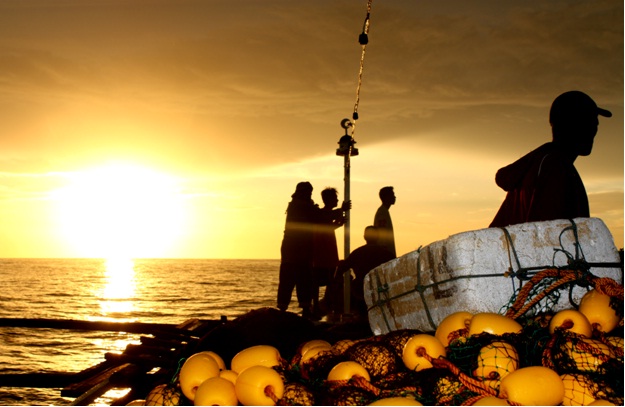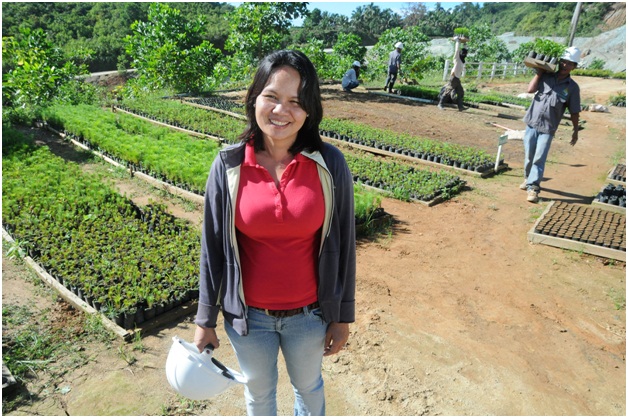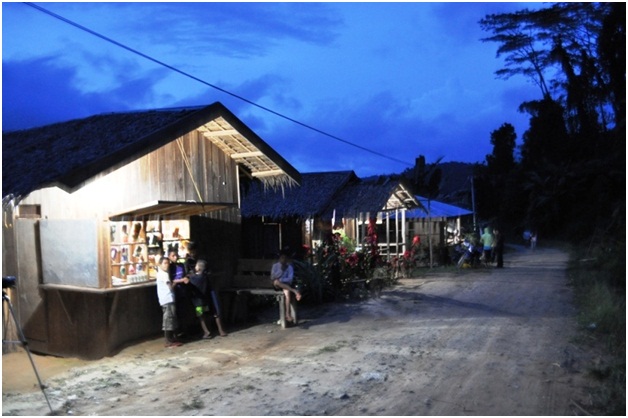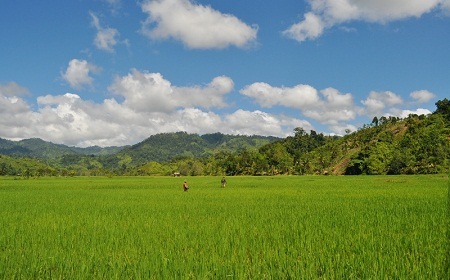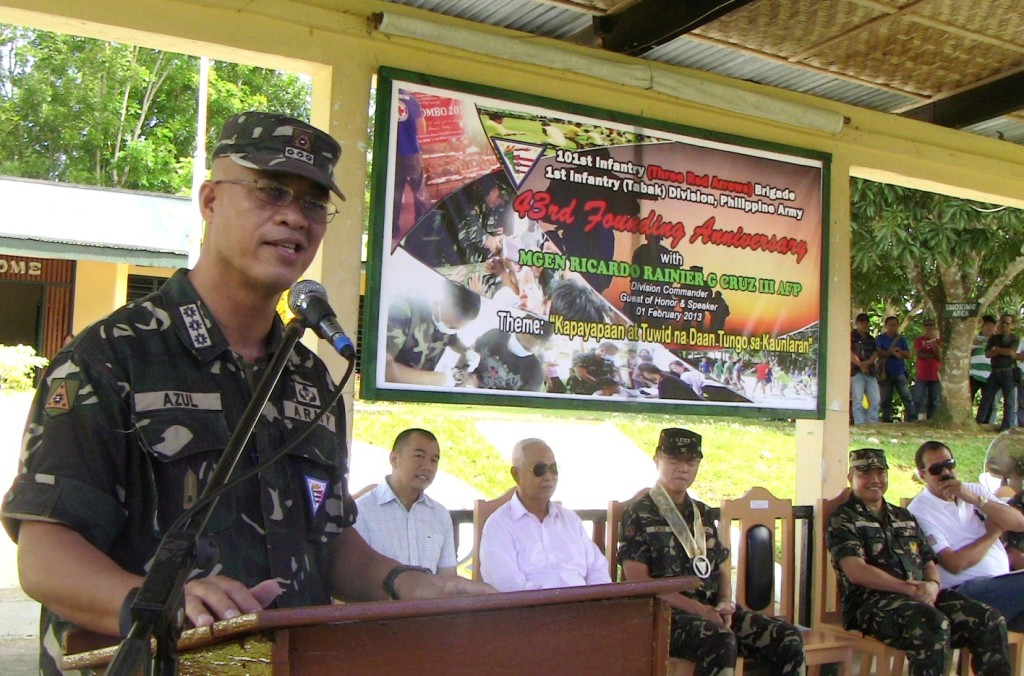TVIRD electrical engineer leads charge
Rey Carubio had often wondered why some personnel in the Mill Department seemed to have low energy levels when they came to work in the morning. The reason, Carubio soon learned, had to do with their nourishment – or lack of it. Because they had too many mouths to feed at home, a number of personnel of the mining operations in this mountainous portion of Siocon, Zamboanga del Norte came to work hungry. Carubio thought they needed a kickstart so that they would be able to focus well on their assigned tasks. He felt he had to do something about it. And he knew how“Please see related Blog “A win-win proposition”.
Carubio, a licensed electrical engineer with a knack for agriculture, decided to conduct basic training in agricultural livelihood not only for his subordinates but for all employees and residents of Sitio Canatuan, the host Subanon indigenous community of TVI Resource Development (Phils.), Inc. (TVIRD). Dubbed Sustainable Agricultural Livelihood Technology (SALT), the first phase of the program initially targeted employees of the Mill Operations Department, as well as personnel of the Special CAFGU Active Auxilliary (SCAA), a peacekeeping unit of the Armed Forces of the Philippines deployed to secure Canatuan.
Above and below, Carubio checks the vegetables and crops planted by his colleagues at the Mill plant who were inspired by his brainchild, which he says is simply a product of common sense. “No person, especially our Subanon brothers and sisters, should go hungry.”
“Feeling sorry after learning about the plight of my men, I drafted a project proposal for a program that I hope would help address their food problem right away,” Carubio, TVIRD Canatuan Mill superintendent, said. He explained that despite the fact that the company is paying its employees well (they receive wages and benefits that are much higher than their counterparts in the Peninsula) Subanon employees of TVIRD still have difficulty making both ends meet. This is because the average number of children per family is five – a lot of mouths to feed indeed! They, however, still prefer their condition now over what they had before TVIRD began operations in 2004. Under the regime of illegal small-scale miners, Subanon women and children labored in tunnels and shafts and carried sacks of rocks, usually heavier than their own weight, to rod mills which were kilometers away. Today, women no longer toil in the mines but are ably supporting their husbands in attending to the needs of their children who, in turn, are now able to go to school to learn and play.
“With the vast tract of land and available resources around the mine site, no person, especially our Subanon brothers and sisters, should go hungry,” Carubio stressed. “We just have to make use of these resources, but with effort and love. By providing basic skills training in agricultural technology through SALT, we hope we will be able to address the problem of food scarcity.”
A few months into the implementation of the SALT’s first phase, Carubio takes pride in the improvement not only in the performance of his men, but equally important, in their health. They have become more energetic and are now able to follow instructions well. An added bonus are the enhanced landscapes around the plant site and the SCAA detachments. Along the covered walkways, security fences, vacant areas, and slopes can be seen a variety of vegetables, legumes and root crops planted in portable waste plastic sacks.
Ruel Ebal, a CIP operator of TVIRD Canatuan, says he will surely have additional income from his vegetable garden, which he tends with his wife and brother everyday after work, around his hut. “We have eggplants, bitter gourd, tomatoes, onions, and string beans.”
Twenty-five year- old, Ruel Ebal, father of a year-old son (his namesake), proudly showed off his 1,200 eggplants, some of which have already borne fruit even as the rest are flowering. “Instead of working for just an hour after our duty, Sir Rey (Carubio) taught us during our SALT-1 training to work on our plants for an additional hour or more everyday,” Ebal related, pointing to his nearly three-hectare vegetable garden around his hut. “My wife, Estefania, and brother, Titing, assist me in this project. We work together until sunset. Apart form these eggplants, we also have ampalaya (bitter gourd), tomatoes, onions and string beans.”
Ruel, a CIP (carbon-in-pulp) operator at the Mill, said two months from now he will surely have additional income from his garden because his wife could already sell some of their tomato and eggplant harvests by then. He estimated that he could produce as much as 500 to 700 kilos of eggplants next month and, if the price of this vegetable will not drop, he could earn as much as P15,000 (around US $340) – a big boost for a family in this part of the world.
Genaro Pacot, a SCAA member, harvests bell peppers for his dinner straight from his own garden. “We get to eat a healthy diet of fresh vegetables and root crops anytime.”
Genaro Pacot, a SCAA member detailed at the detachment overlooking the ongoing construction of TVIRD’s Sulphide Dam for its Copper-Zinc Project, is pleased with his involvement in SALT: “Sa SALT Program, ang panginahanglanon namo sa pagkaon diri sa detachment dili na problema. Mahimo kaming makakaon sa himsog nga kinan-an nga naglangkub sa preskong mga utan ug lagutmon sa bisan unsang panahon (With the SALT program, the food requirements here in our detachment are no longer a problem. We get to eat a healthy diet of fresh vegetables and root crops anytime).”
Jun Ortizano, team leader of this detachment, proudly declared that his detachment is now regularly supplying pechay (a variety of cabbage), tomatoes and radishes to the mess hall. Flor Bade of the Administration Department confirmed this as she showed the duplicate of the official receipt he issued to the SCAA when she bought these produce from them. She added that she now also sources vegetables from the Tanuman and Mambong detachments, as well as from spouses of employees who have surplus harvests from their backyard gardens.
“Namalit mig gulay diha sa mga asawa gikan sa Tanuman, Solonsangan ug Paduan Ridge labi na gyud gikan kang Helen ug Bebing Berioso nga daghan ug petsay, talong ug kamates,, (We’re also buying vegetables from the wives residing in Tanuman, Solonsangan and Paduan Ridge, especially from Helen and Bebing Berioso who have lots of eggplants, pechay and tomatoes),” Bade said.
To ensure the sustainability of SALT, Security Force Department Manager Arnel Cabunilas said he would recommend that a portion of the income from the sale of vegetables be kept in a fund. This way, he said, the participants will be able to buy more seedlings.
(Above) Carubio (standing, in blue polo shirt) watches participants to the SALT-2 training session solve a puzzle as a team. (Below) “There will always be problems that will be encountered in any project but what is important is the willingness of every team member to solve the problems united as a team,” says Thess Limpin, manager of TVIRD’s Community Relations and Development Office, during her lecture. Beside Limpin is Security Force Department Manager Arnel Cabunilas.
at and livelihood training sessions for Subanons in agri-business. In implementing SALT, Carubio coordinated with the company’s Community Relations and Development Office and the government Department of Agriculture.
“SALT also aims to demonstrate to the Subanon community and interested farmers the proper way of preserving the environment, particularly on the subjects of slope farming, soil erosion, nurturing the soil, and the eradication of the traditional – and environmentally destructive – slash-and-burn method of farming still being employed by many Subanons,” Carubio pointed out.
For the second phase of SALT, he plans to provide additional agricultural planting materials, as well as poultry and feeds, to program beneficiaries. Mario Anghag, Mill supervisor, said that other Mill employees have joined Carubio as trainers in SALT-2, among them Roberto Absalon whose variety of plants around his house has also flourishing.
Mill Supervisor Mario Anghag with sacks of camote root crops: “SALT set a trend where workers go straight home early right after their shift to be able to do their one-hour task of vegetable planting.”
Anghag averred those involved in the program also affectionately refer to SALT by another name: FAITH, which means “Food Always In The Homes.” “His love for farming and for sharing his knowledge with employees made him come up with an idea that has changed an old culture where people just wait for things to happen into a new one where people make things happen,” Anghag tells of Carubio. “In the process, SALT participants also enjoyed improved incomes. The program also set a trend where workers go straight home early right after their shift to be able to do their one-hour task of vegetable planting. And it all just started with Sir Rey’s desire to make the workers more efficient in carrying out their duties at the plant.
“Karon panagsa ka na lang makakita ug empleyado nga maglingkod-lingkod sa mga tindahan. Kasagaran, tua sa ilang mga balay, nagtanom,” Now you see only few employees just sitting in the stores (drinking alcohol). Usually they’re in their homes planting, ” Anghag added.
Carubio still has bigger plans for SALT: “Through this program, we hope to be able to supply the total vegetable demand of the company’s mess hall and, at the same time, help the Subanons shift from the old `lazy-and-cash culture’ – where people wait for good fortune to happen to them without making an effort or paying hard earned money for almost everything like services and even food – to a culture of planting. They get to have additional income derived from the proceeds of their portable vegetable farm and shift to a genuine sustainable agriculture.”
The SALT Program has been adopted by TVIRD for its second five-year Social Development and Management Plan (SDMP) to ensure food security for its host community. Carubio has been tapped as a consultant for this component. The SCAAs who participated in SALT, meanwhile, will also be tapped as trainers of the community when the program is implemented under the SDMP. Their involvement is part of TVIRD’s efforts to civilianize security in Canatuan, an initiative that will primarily see the deactivation of the SCAA unit in the area and the turning over of its security functions to a private security agency.
In April 2008, TVIRD began decommissioning activities for its Gossan (gold-silver) Project, the first phase of its Canatuan operations. Already, earthwork and construction of the company’s Sulphide Dam and Mill Plant for its Sulphide (copper-zinc) Project, the second phase, are underway. The company expects to commence production in the fourth quarter of this year. (Rene Patangan and Lullie Micabalo)
(Above) An added bonus of SALT are the enhanced landscapes around the plant site and the SCAA detachments. Along the covered walkways, security fences, vacant areas, and slopes can be seen a variety of vegetables, legumes and root crops planted in portable waste plastic sacks. (Below) Multi-cropping on slopes at the back area of the Mill plant.



